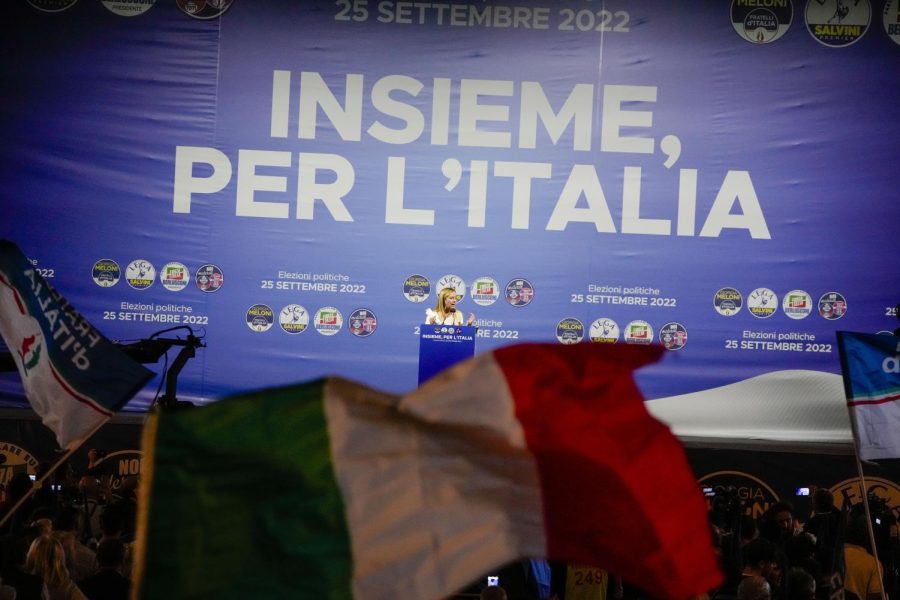‘None of this exists in a vacuum’: Pitt community reacts to Italian right-wing political developments
Brothers of Italy’s Giorgia Meloni speaks during the center-right coalition closing rally in Rome on Thursday.
October 26, 2022
Pitt students and professors emphasize that international politics are interconnected and people around the world should pay attention to world politics, in the wake of Italy’s parliamentary elections that placed Giorgia Meloni in power.
Lina Insana, an associate professor of Italian, said she includes the history and current state of Italian fascism in the courses she teaches, especially considering recent elections.
“Fascism is one of Italy’s best-known exports to the world, a political model that unfortunately other states and political groups have adopted and modified,” Insana said. “I want my students to be aware of these situations and understand why they’re notable.”
Fascism is defined by Merriam-Webster as “a political philosophy, movement, or regime that exalts nation and often race above the individual and that stands for a centralized autocratic government headed by a dictatorial leader.”
Anthony Ocepek, an associate professor of political science, explained how the Brothers of Italy, Italy’s farthest-right party, have gained power slowly but steadily. The Brothers of Italy were created in 2012 with now-Prime Minister Meloni as a founding member, who formerly praised the original Italian fascist party headed by Mussolini.
“The party has its roots in the Northern League and Five Star, which are different parties that advocate for distancing themselves from the EU,” Ocepek said. “I wasn’t shocked by the outcome of the election because ever since the 2008 financial crisis, Italians have been dissatisfied. Giorgia Meloni isn’t a new figure. She’s been involved in right-wing youth groups and Italian politics for years.”
Ocepek said the Brothers of Italy, also known as Fratelli d’Italia, have gained power partly because of its response to the growing concerns of the Italian middle class.
“Since 2008 there has been a movement of voters who are disaffected by the way things are in the country, primarily regarding the economy and job opportunity, but also migration,” Ocepek said. “It seems to voters that the status quo hasn’t resolved any issues, so they turned to the party offering the most different approach.”
Insana has taught courses on Italian fascism for multiple years and said the influence of fascism is rooted in its origins.
“The Brothers of Italy, the party that is receiving the most attention in the press, claim their direct heritage to what was left of the Italian fascist party after World War II,” Insana said.
Insana teaches classes specifically geared toward Italian fascism and said it’s important for American students to know the “warning signs” of a fascist party or state so they are able to identify fascist trends in their own country.
“Fear of others, anxiety about immigration, anxiety about the loss of Italianness, middle-class anxiety about the loss of power and prestige are all things that fascists use to gain support,” Insana said. “I try to make students know that the threat of fascism is always with us and the characteristics of fasicm might be present even if not every single trait is there or a party hasn’t been explicitly declared fascist.”
Insana said she focuses on how fascism’s initial rise is still a teaching point to discuss when analyzing modern-day movements.
“The historical moment that was the rise of fascism 100 years ago has a lot to teach us wherever we are about class conflict and the relationship of culture to politics,” Insana said. “I think we as Americans would do well to look to 100 years ago in Italy and see how things unfolded there. We could learn a lot from that moment.”
Daniel Turillo, a senior political science, economics and Italian major, said the election of Meloni and the far-right Brothers of Italy party to majority power did not surprise him.
“This is the direction Italy has been heading in for years and the direction that most of the Transatlantic sphere has been heading in, so Meloni’s win wasn’t out of the blue,” Turillo said.
Turillo said his classes and knowledge on the subject of fascism helped him to contextualize the Italian elections in a global sense.
“None of this exists in a vacuum at all, it’s nothing that can or should be written off as an anomaly,” Turillo said. “The social and cultural issues we’re seeing in countries with a rise of fascism are similar across borders. Fascism provides an easy opening to manipulate the ‘us vs. them’ fears.”
Ocepek said there are connections between cultural and political movements in the United States and Italy right now.
“The desire to preserve Italian culture through things like curtailing abortion rights and pushing back on LGBT rights mirror the conservative desire to preserve American values,” Ocepek said. “A student may not think we can learn something from looking at other cultures and governments, but a lot of the arguments are the same. It’s important to create that connection to help us understand the trajectory of our own country as well.”
Ocepek said there are specific parties and talking points in the United States that are mirrored in the Brothers of Italy’s stances.
“Even though we have a two-party system in this country, just because we don’t see that type of system here, we kind of still have it,” Ocepek said. “The Democratic party has the more progressive versus conservative wings, the Republicans have the freedom caucus and Christian nationalists versus more center-leaning ones. But because of the majoritarian system we have, the factions are kind of hidden.”
Turillo said he is alarmed by the recent fascist turns in different countries and hopes people, especially students, pay close attention to the developments and understand “it can happen anywhere.”
“When far-right movements enter the mainstream as profoundly as they did in Italy, it needs to be talked about and addressed,” Turillo said. “When it’s happening somewhere, it’s happening everywhere.”




